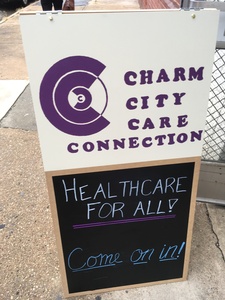A Healthy Connection
By Kelly Medinger
08-23-2018
Charm City Care Connection uses health care grant to help marginalized residents in Baltimore link to high-quality medical care and social services
 When Macy showed up at Charm City Care Connection’s clinic in East Baltimore, she wanted help getting medical insurance coverage. The case management team signed her up for Medicaid and reconnected her with her primary care doctor. They also recommended she do some preventative health screenings their medical team was offering that day – which was how they found her blood pressure was dangerously high.
When Macy showed up at Charm City Care Connection’s clinic in East Baltimore, she wanted help getting medical insurance coverage. The case management team signed her up for Medicaid and reconnected her with her primary care doctor. They also recommended she do some preventative health screenings their medical team was offering that day – which was how they found her blood pressure was dangerously high.
Without insurance for several months, Macy had been cutting her blood pressure pills in half to save money. Now facing a health crisis, the clinic staff rushed her to East Baltimore Medical Center where a medical team got her blood pressure under control and restarted her on the correct dosage of medication. Crisis averted.
About Charm City Care Connection
Founded in 2009 by Hopkins students in collaboration with the East Baltimore community, Charm City Care Connection (CCCC) helps Baltimore’s poorest families access high-quality medical care and social services. CCCC staff and volunteers meet with clients through walk-in clinic hours at two community locations and build long-term relationships with them through home visits, phone calls, text messages, and hospital visits.
“Macy’s case is a wonderful example of how we connect residents to the health care they need and want, and also find undetected health issues that could easily get out of hand,” says Wynn Engle-Pratt, Executive Director of CCCC. Macy is now working with CCCC’s medical student volunteers on long-term goals to continue to improve her health and wellbeing.
Expanding to Meet the Needs
CCCC received a Knott Foundation grant in 2017 to expand its services and open a second clinic location. Using neighborhood indicators, the organization selected Dee’s Place as their second site. Dee’s Place is one of the only 24-hour-a-day addiction programs in Baltimore, and research shows addiction issues have a strong correlation with chronic health and social service needs.
With two locations in East Baltimore that residents know and trust – Dee’s Place, and one at The Men and Families Center – CCCC has seen its client base grow by more than 40% and has been able to make even more referrals to social services. Most often, clients need help getting dental care, finding affordable stable housing, and enrolling in medical insurance. Access to mental health treatment is a rising need as well.
“Overall our success rate is about 75% for meeting a client’s individual need for services,” notes Engle-Pratt. The most common barriers are dental care (which is often not covered by insurance) and access to mental health treatment.
New Ways to Promote Health and Well-Being
CCCC hasn’t stopped growing. The organization just piloted a community training program for Naloxone use in emergency situations and is now looking to develop a healthy cooking and lifestyle class. They are also preparing to welcome a group of new nursing student volunteers from Johns Hopkins School of Nursing to complement the teams of medical residents and students already dedicating their time to CCCC.
“My future interest lies in how to incorporate Charm City Care Connection’s comprehensive model for meeting patients’ needs into the wider healthcare system,” reflects Engle-Pratt. “There is a real opportunity for primary care to provide day-to-day, long-term case management and address people’s needs for housing and other services that so greatly impact their health.”
